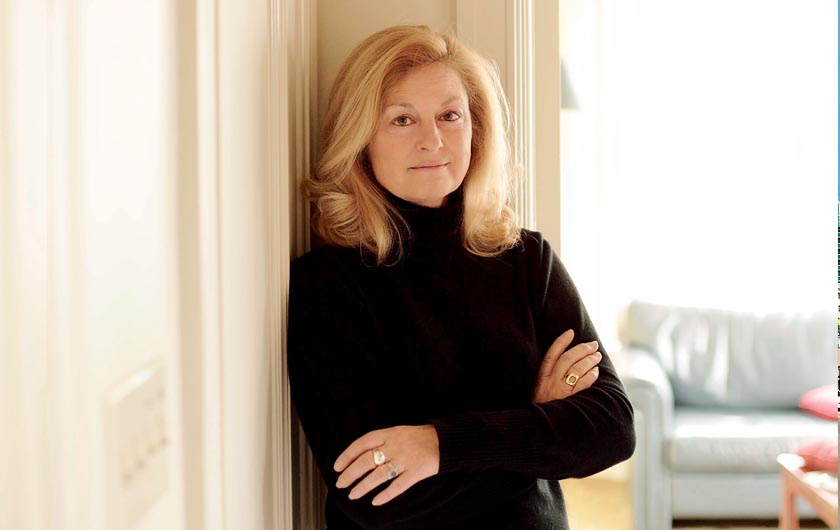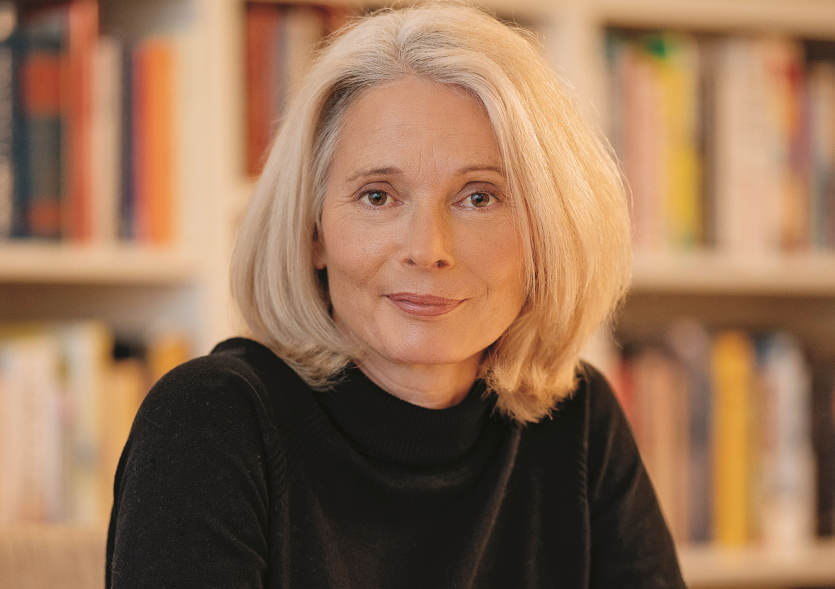“I couldn’t believe someone would pay me to read,” the publishing legend says of her early career
By Peter Feniak
Photo: Courtesy of Simon & Schuster Canada.
Anna Porter is a Budapest-born “new Canadian” who arrived in the midst of a golden age in Canadian culture. She found a career and a home, and friendships with remarkable Canadians. In her memoir In Other Words (Simon & Schuster Canada, 2018), Porter revisits those years.
The book is subtitled How I Fell in Love With Canada One Book at a Time, and in a series of short chapters, Porter offers impressions of Canadian greats including Pierre Berton, Leonard Cohen, Farley Mowat, Irving Layton, W.O. Mitchell, Margaret Laurence, Peter C. Newman, Sylvia Fraser, and Margaret Atwood.
A legend in Canada’s publishing industry, Porter began her career with the creative (and sometimes chaotic) Canadian publisher McClelland & Stewart, known widely as “M&S.” She rose steadily at M&S and eventually ran her own publishing house, Key Porter Books. Today, Porter is an Officer of the Order of Canada and the author of nine books—ranging from crime fiction to European history—and a veteran of corporate boards.
It was 1968 when Porter stepped out of a Toronto cab “carrying a battered blue suitcase with no handle that held all my worldly possessions.” She was Anna Szigethy then (pronounced Sigetti). She and her mother, Maria, had fled Budapest when Russian tanks rolled in to crush the revolution of 1956. (Her father, Istvan Szigethy, was arrested in Hungary and sent to the Russian Gulag, briefly returned, then disappeared from her life.)
Schooled in New Zealand, Porter moved on to the swinging London of the ’60s and arrived in Canada dressed for the times: “I wore my white vinyl knee-high boots, a mauve minidress, a short bunny-fur coat, ironed-straight blond hair,” she recalls in her memoir.
“Oh, yeah, I was full of beans,” she says over coffee near her mid-Toronto home. “Very ambitious.”
Along with that battered suitcase, Porter had two university degrees, fluency in languages, and a letter of recommendation from a British publisher. “I liked Canadians,” she says. “I met interesting people right off the bat.”
She started off reviewing imported American textbooks to catch and delete unwanted US references (“as American as apple pie”). Then came a job opportunity in educational publishing. “I would have taken it,” she says, “had I not taken one of those aptitude tests”; she was found “particularly unsuited for the position.” As for Canada, she says, “I wasn’t sure I was going to stay.”
But the excitement of the Centennial and Expo 67 had fired interest in things Canadian, and Canadian culture had a bounce in its step. “Canada,” Pierre Berton wrote, “was in love with itself.” McClelland & Stewart published some of the most exciting writers in the country, and when Porter landed an interview with M&S, she was keen. “I was also starving!” she laughs today. “It’s a kind of motivation. I really needed a job!”
Being Paid to Read
At the helm of M&S was the daring, dashing Jack McClelland, a US Navy veteran who loved good writing and had energetically reinvented the family publishing business. As Porter met with the shaggy-haired, chain-smoking, vodka-loving titan of M&S himself, she recalls, “I knew very little about Canada, and my resumé was really a work of fiction.” Her soon-to-be boss didn’t mind: “Jack thought, This is just hilarious! He loved the fact that I’d made up all this stuff.” As a new “editorial coordinator,” she would cope with the “average of 50 manuscripts a week” that arrived at the drab M&S offices. In love with stories since childhood, she dug in. “I couldn’t believe someone would pay me to read,” she says.
“It was an extraordinary time,” Porter writes. She details the mountain of challenges facing M&S: overheads were high; margins, tight; and production costs—especially for high-quality art and photo books—often soared over budget. Warehousing returned or to-be-sold books was costly. Convincing booksellers to stock “the latest Canadian” was tough. Authors demanded more from the crusading culture company.
Sometimes there was magic. Thrillers by Charles Templeton and Richard Rohmer became hot sellers. Leonard Cohen’s Selected Poems 1956–68 was a sensation. Roloff Beny’s polished photo volumes drew raves. And M&S triumphed with a trio of legendary Canadian storytellers. Pierre Berton’s works included The National Dream and The Last Spike, exciting tales of early Canada newly bound by rail. Peter C. Newman’s three-volume series The Canadian Establishment shone a revealing light on Canada’s wealthy. And Farley Mowat’s famous titles, from Never Cry Wolf to The Boat Who Wouldn’t Float, sold worldwide in the millions.
Some of the famous M&S authors, including the ebullient Mowat and the shy, brilliant novelist Margaret Laurence, became Porter’s good friends. Her memoir includes portraits of them and others in the publisher’s colourful gallery of Canadian talent—“the big, brawling poet” Al Purdy, the poet Earle Birney (“tall, spindly, white-bearded…with a strong resemblance to Don Quixote”), Irving Layton (the broad-chested “Messiah from Montreal”), and Leonard Cohen (“how fragile he seemed”). And there were the “Amazing Ms. Atwood” (“I didn’t know then that she was a genius”) and Pierre Berton (“six foot four with white mutton-chop sideburns” and “a bemused look that suggested he was interested in but unconvinced by whatever you said”).
When it came time to celebrate a new book or an author’s milestone, Jack McClelland did it in style. That could mean lavish dinners, with plenty of booze. At one of them, a heavily refreshed Farley Mowat crawled the length of the dinner table in his kilt, revealing what a Scotsman wears beneath. Promoting The Emperor’s Virgin, McClelland and author Sylvia Fraser dressed in togas to ride a chariot down Toronto’s Yonge Street (a blizzard thwarted their Ben-Hur ambitions). Margaret Laurence’s classic The Diviners was launched at the Ontario Science Centre, with two water diviners searching the grounds as the uncomfortable author hid from the media behind a bush. Celebrating the 10,000th printing of The Last Spike, the publisher ordered a huge cake with 10,000 candles. “The candles on the cake!” Porter smiles. “That’s how I met my husband. That was some party. He wasn’t there, but he saw a picture of me in the paper the next day.”
Julian Porter, a noted Toronto lawyer, called for a date. He was nervous, and the date went badly. Things improved, though, and love and marriage (January 1972) and two children—Catherine and Julia—followed. “We’re still married,” Porter laughs, “a tradition that’s not common to people in my family. He’s a reader. That makes a big difference.”
Within M&S, Porter’s role grew: she became the managing editor, executive editor, editor-in-chief, vice-president. “I think Jack figured a new title meant he didn’t have to give me a raise,” she writes. “He considered it a privilege to be at M&S with the country’s best authors…if anyone felt it was not enough, he or she could leave.”
The work was demanding and the hours long, but Porter was passionate about her new country’s writers. “By the end of my first decade in Canada,” she writes, “I no longer saw myself as an immigrant.” However, as the 1970s—and M&S’s financial troubles—went on, the glory days began to fade.
The latter half of In Other Words details the joys and sorrows that followed. First came a restless year off. Porter returned to M&S in 1979 as the president of Seal Books, a division that published both well-known and some new titles, but by 1982, her M&S days were over. In an alliance with entrepreneur Michael de Pencier, publisher of the successful “Key” guides to cities, she launched Key Porter Books.
The farewell to Jack McClelland was painful, but he wished her well. Despite government support, M&S was struggling badly. McClelland eventually sold the company, then saw it absorbed by a global conglomerate.
Porter began looking for new authors for Key Porter. She convinced acerbic political columnist Allan Fotheringham (“Dr. Foth,” as he was known in Maclean’s) to seclude himself for a month and write. His Malice in Blunderland, or How the Grits Stole Christmas (Key Porter, 1982) became a No. 1 Canadian bestseller. Talented political writers—Stevie Cameron, Claire Hoy, and Peter Worthington among them—followed Dr. Foth.
Porter also convinced a popular former politician to share his thoughts—Jean Chrétien’s folksy memoir, written with Ron Graham, struck a chord in both French and English: Straight From the Heart (or Dans la fosse aux lions, Key Porter, 1985) sold more than 250,000 copies. Key Porter was named “publisher of the year.”
Later, for Key Porter, celebrated Canadian filmmaker Norman Jewison would write his memoir This Terrible Business Has Been Good to Me (2004). The title likely resonated with Porter.
The World of Words
Canadian publishing remains a challenging business. “Disaster hit in 1995, when book superstores came to Canada,” Porter writes. The big box bookstores asked publishers to pay for prime displays of their books, developed tough policies on book returns, and narrowed the list of Canadian books carried. “There is no long-term cure,” her friend Farley Mowat wrote to Porter in a gloomy note. “Eventually everything will be run by the conglomerates and…accountants.”
“I think the time of the personal publisher—the individual committed to putting out really wonderful books and having the guts and imagination to do so, and pushing writers—I think unfortunately that era is passing,” Porter says over coffee.
Porter sold her stake in Key Porter in 2004. The company was absorbed by H.B. Fenn and ceased publishing in 2011, the year Fenn declared bankruptcy.
Of the end of Key Porter and the shifting tectonics of the book business, Porter speaks carefully. “There were certain things that were cut out of the book for legal reasons,” she tells me, “and some of those were my last years’ experiences with people.”
With margins tight, Canadian publishing continues to receive government support—some say not enough. There are independent Canadian publishers and booksellers who thrive; others have disappeared or been absorbed by large global entities. M&S is now owned by the German media giant Bertelsmann.
Yet Canada, according to Publishers Weekly, remains “a nation of readers,” with healthy library systems and over 80 per cent of Canadians reading “at least one book a year.” And certainly Porter’s love of reading (inspired by her grandfather, Vili Rácz, a charismatic storyteller) has never dimmed. “When I had small kids and those big jobs, it was hard to find the time to read. Something had to give,” she laughs. “And it was sleep. Sleep and getting my hair cut.”
Looking back on her career for her memoir was “mostly very happy,” Porter says. “I had a lot of fun. And—what’s really wonderful—I went back to rereading, rereading work that I still think is brilliant.”
The memoir brought twinges, as well. “So many are gone,” she says of the great writers and poets she knew. Gone, too, are journalists she became close to, including Peter Gzowski and “great friend” Barbara Frum. She laments Canada’s “tall poppy syndrome,” the urge to cut down those who excel, and how, she says, it hurt Gzowski, Berton, and Mowat.
Porter’s passion remains the world of words. Reading, she says, “teaches empathy…gives you life experience without having lived the life, gives you a sense of other people’s psyches.” She remains “optimistic about people wanting stories. It was there thousands of years ago, when we gathered around the fire. I think it’s going to be there forever—in different forms, maybe.”
Of Canadian literature’s new voices she says, “I just read Esi Edugyan: brilliant. [Edugyan’s third novel, Washington Black (HarperCollins, 2018), won Canada’s biggest literary award, the Scotiabank Giller Prize, for 2018.] But you don’t have to demolish the past in order to invent a new literature. There’s no reason she can’t exist in a literary firmament alongside Margaret Laurence.”
Porter praises the high visibility of the Giller Prize. Her memoir has warm words for Jack Rabinovitch, the late Montrealer who founded the prize in memory of his book-loving wife, Doris, and Porter dedicated In Other Words to the “two Jacks”: Rabinovitch and McClelland.
Looking back on her decades in publishing, Porter writes: “I miss the companionship of my peers, the moment of recognition when a new manuscript reveals itself to be a work of art or insight or sheer brilliance. I miss the delight of holding one of our new books in my hands; I love even the smell of fresh book pages.”
She remains a writer, often commenting on the Central and Eastern European politics she follows closely. And, she adds, “I’m going to write another mystery.
“Back when they were teenagers,” she says of her two daughters, “they thought, Why?, about my working.” Now her daughter Catherine, a gifted journalist, is the Canadian correspondent for The New York Times and about to release a book on her experiences reporting from earthquake-torn Haiti. And her other daughter, Julia, is the director of programs for the Jays Care Foundation, created by Toronto’s Major League Baseball team to support disadvantaged kids across Canada. Each is mother to two children. Porter thinks of them, remembering herself as a young woman arriving in Canada:
“I didn’t really think that there was anything I couldn’t do—something I’m trying to impart to my children—in the sense that if you can make up your mind to do something, you can get there. It may not be as easy as you hope, but you can get there.”





